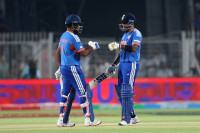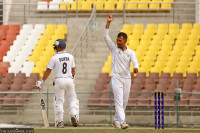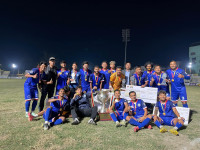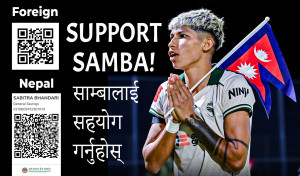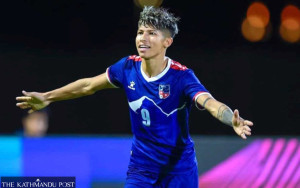Sports
Nabita Shrestha calls for equal pay, urges the private sector to invest in table-tennis
Bold on and off the table tennis board, Shrestha who has long dominated the sport in the national scene, aims at representing Nepal at the Olympics.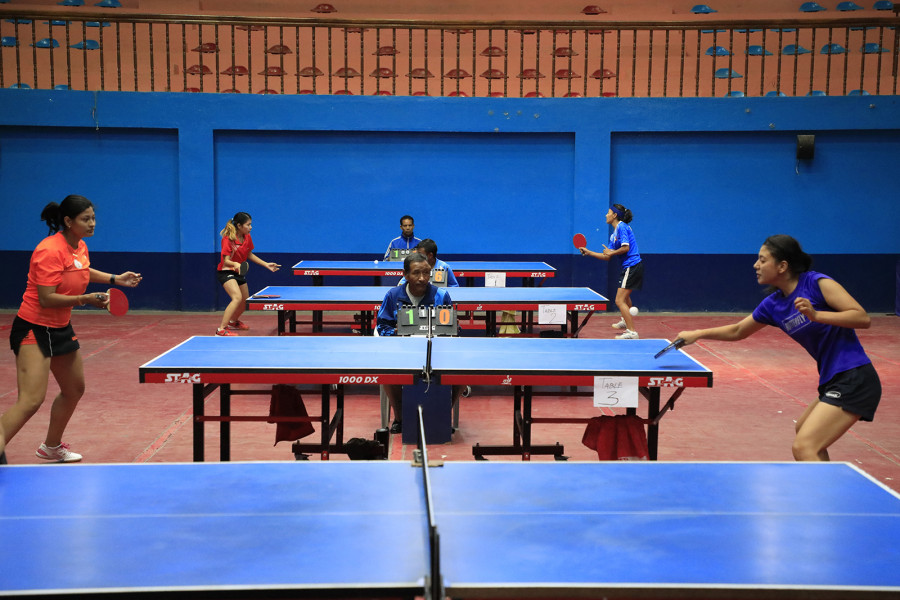
Prarambha Dahal
Nabita Shrestha, the eight-time national table tennis champion whose list of accolades is unparalleled in the sport’s history in the country, is looked upon as a legend by aspiring players in Nepal.
Having tried her hands in taekwondo and other sports while growing up, Nabita began her professional career in table tennis when she was in the eighth grade at Bijeshwori Higher Secondary School. It was when she first met her longtime coach and now husband Rakesh Maharjan. With a subtle smile on her face, she recalls her journey from playing on cemented and wooden tables to representing Nepal in the international arena.
Shrestha, who is decorated with national and international success, see a massive gulf between the table-tennis infrastructure in Nepal and those at the international arena.Speaking at the sidelines of the South Asian Games Qualifiers at Covered Hall in Lainchaur, Nabita complains: “The balls that we use and the boards we have at our disposal are outdated. It does not offer suitable bounce while the floor is ill-maintained and slippery. This absolutely affects the game of any player.”
Shrestha adds: “Even the training facilities in other nations are better than our covered hall which hosts national and international tournaments.” Considering the upcoming 13th South Asian Games scheduled for December 1-10 in Kathmandu and Pokhara, Shrestha urges the National Sports Council and other stakeholders to ensure sound infrastructure as it is directly associated with the pride and prestige of the country.Sharing her ambition of winning the gold medal in the women’s singles at the upcoming regional Games and the dream of at the Olympics, Shrestha identifies her biggest success so far as winning a bronze in the women's doubles alongside Elina Maharjan, her sister-in-law and nemesis, at the 12th South Asian Games in 2016 in India.
Having dominated the national rankings for over eight years, Shrestha idolizes German table tennis player Timo Boll (6th in the ITTF World Rankings as of June, 2019) and speaks fondly of her inspiration Usain Bolt while quoting the Jamaican “I am driven by the fact that if I have to continue competing and winning, I have to train hard.”When asked about the financial recognition and benefits for ping-pong players in Nepal, Shrestha says: “Unlike cricket or football where national and international tournaments are frequent and boast massive fan-following, table-tennis remains in the shadows in Nepal. The International Cricket Council and All Nepal Football Association seem to have set plans for the remuneration of cricketers and footballers. Such aspects seem like fairy tales for us. This sport is actually costly as the equipment doesn’t come cheap.”
Shrestha adds: “Despite the departmental clubs supporting the players, the amount the players receive is not even enough to buy a minimum required gear. This sport is simply very difficult for aspiring players from economically struggling families.” Shrestha identifies the need for the engagement of the private sector in table-tennis to uplift the standard of the sport and the players. She further urges the government to provide the basic social security for all athletes including health, insurance and cash incentives.Echoing the voices of American women’s football team captain and World Cup winner Megan Rapinoe, the 27-year old player calls for equal pay (among men and women athletes). She says, “Associations and organisers of the tournaments must not have any disparity in the remuneration or cash rewards for men and women players. At the end of the day, if a tournament is won, medals are added in the name of the country, this often goes unnoticed. In fact, women must be encouraged to participate in sports as that would help build a sporting culture within families and that would also provide a platform to achieve great results.” Shrestha gives an anecdote of having boycotted a tournament in Butwal as the women participants were paid less than their male counterparts in the previous edition.
Shrestha who has been relentlessly involved in table-tennis in Nepal says her passion for the sport and the name and fame it brings along with it are the factors that have kept her driven and attached to it. She adds that the sport has taught her to be patient in life.Speaking of the standard of the tournaments in Nepal, Shrestha said that Nepal had a long way to go in organising quality leagues and tournaments but did not shy away from adding that the signs of improvement were beginning to appear on the horizon.
When asked about her personal life and support from the family, Shrestha proudly shared the fact about the support from her coach and husband Rakesh Maharjan. “My family is largely involved in table-tennis. I urge all women in all walks of life to make the right decision while getting married. You always have to put your own aspirations first. Giving up on your dreams for marriage is simply not worth it.”Commenting on the potential that Shrestha possesses, Maharjan said: “She is a penhold player with an attacking approach. Her service is her strength and she can adapt to the game and conditions against her opponents. If she keeps herself psychologically strong, it will help her better to form strategies in challenging situations during important and competitive matches.” Maharjan expects his wife to strike gold for Nepal in the women's singles.
Away from the table tennis board, Shrestha has been equally involved in philanthropic gestures. As the golden girl of Nepali table tennis, she has provided the National Physical Disabled Table Tennis Association with sports gear worth Rs 120,000 in October, 2016. The same year, she handed over food, clothes and educational materials to the HIV-affected children in Kirtipur.Shrestha, who is a role model for hundreds of thousands of young girls and children in the country, urges the current crop of generation to indulge themselves more in sports than engaging in online social media. An MBA graduate herself, she says: “Education is equally important. Children today need to realise the fact that being good at sports earns scholarships in great schools and universities. There are numerous benefits, don’t confine yourself in the digital world as there is more to life than the virtual world.”
Her achievements have laid the foundation for a bright future of table-tennis in Nepal and going by her confidence she seems more than ready to embrace new challenges to add to her script in her own magical style. By the look of it, the top-ranked player appears set to rule the game for quite some time.The time between now and the Tokyo Olympics is very precious for Shrestha’s dreams to come true. A sound roadmap needs to be laid out. There is a lot of enthusiasm in table-tennis in Nepal and the moment. It is very important to carry this momentum forward so the future can witness many more Nabitas with international awards. Only two Nepal athletes Sangina Baidhya and Deepak Bista—both taekwondo stars who have now retired—have earned qualification to the Olympics. Apart from the two, Nepal’s participation in the Olympics have been on wild card entries. The fact makes a daunting task ahead of Shrestha to realise her Olympic dream.




 9.83°C Kathmandu
9.83°C Kathmandu
